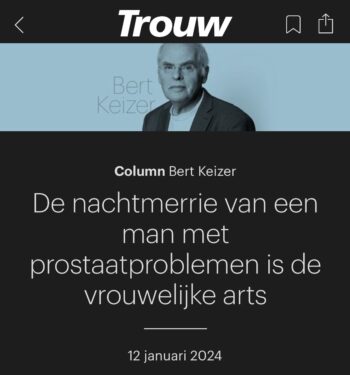
Great, finally a male perspective on the discussion about the performance of male and female doctors. None other than dr Bert Keizer, physician and philosopher, opens his column in the Dutch newspaper Trouw with an intriguing scenario, presented in the title: The nightmare of a man with prostate problems is a female doctor. With his sharp and humorous voice, he discusses the interview with me published earlier (see December 18th) in the NTvG. I am happy with his support and critical reflections.
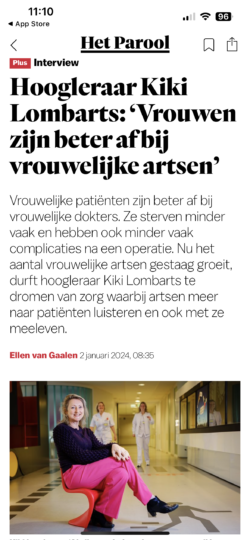
As with many, my new year started with a phone full of messages. On January 1st, I received many good wishes for 2024 from family and friends. But today, January 2nd, it was mainly reactions to a big interview in the AD about women and female qualities in healthcare.
Large clinical studies show that female patients are ‘better off’ if they are helped by a female medical specialist; this has been demonstrated for surgeons (based on research into 25 different surgical procedures), cardiologists (study of patients who present with a heart attack at the emergency department) and internists (research into 8 most common internal diagnoses). ‘Better off’ means hard patient outcomes such as fewer complications, fewer readmissions and lower mortality rates. The studies I refer to are done with American, Canadian and Swedish data. Sometimes the differences between male and female doctors are large and (also clinically) relevant, other times small, but always significant and consistent in favor of women.
Yet the question is not a men-versus-women issue. We do need to (want to) investigate what can be learned from the observed differences. For men and women. And also the unequal appreciation of male versus female qualities is more than worth discussing. Why? Because all human qualities are important for being able to provide good patient care. I spoke about these topics with AD journalist Ellen van Gaalen. It became a page-wide story (in Dutch). On January 3rd, the interview appeared in Het Parool.
NPO1 radio picked up the article and talked about it further in the Fact & Fiction section (EenVandaag). Listen here.
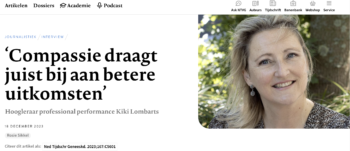 At the end of the year, the Dutch Medical Journal – NTvG – discusses ‘tipping points’ in care and society. In an interview (in Dutch) with Rosie Sikkel, I spoke about the shift to more women and ‘female qualities’ in medicine. The latter is especially necessary. ‘Female qualities’ – such as listening, empathizing, compassion and intuition – were long attributed to women, but men and women can of course be compassionate, comforting and really empathize with the patient in front of them. It is important that we also appreciate these human qualities as indispensable for good and effective care, and (therefore) pay more attention to them in the training. Not as an ‘extra’ or ‘nice to have’ or ‘optional’, but simply because there is scientific evidence that these qualities are good for patient outcomes and good for the care professionals.
At the end of the year, the Dutch Medical Journal – NTvG – discusses ‘tipping points’ in care and society. In an interview (in Dutch) with Rosie Sikkel, I spoke about the shift to more women and ‘female qualities’ in medicine. The latter is especially necessary. ‘Female qualities’ – such as listening, empathizing, compassion and intuition – were long attributed to women, but men and women can of course be compassionate, comforting and really empathize with the patient in front of them. It is important that we also appreciate these human qualities as indispensable for good and effective care, and (therefore) pay more attention to them in the training. Not as an ‘extra’ or ‘nice to have’ or ‘optional’, but simply because there is scientific evidence that these qualities are good for patient outcomes and good for the care professionals.
This is what team work looks like. What a continuous challenge to align patient care and educational goals. In a previous publicatie in Academic Medicine we addressed the efficient use of clinical performance data, by using known data from the EHR for residents’ assessment and feedback. In this new publication, under the leadership of dr Alina Smirnova, PhD, we test cased our own ideas for two clinical paediatric illnesses. Spoiler alert: this study contains new perspectives to positively impact patient care and residency training.
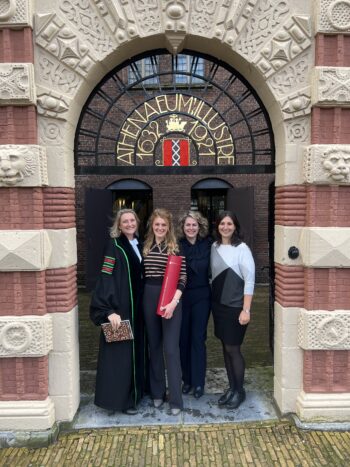 Today Iris Jansen convincingly defended her PhD thesis, titled: Interactions that Matter: Understanding Residents’ Professional Growth Through Workplace Relationships. Please go read this impressive work here. This picture shows the all female research team: dr Milou Silkens, PhD en dr Renee Stalmeijer, PhD as Iris co-supervisors, and myself as Iris proud supervisor.
Today Iris Jansen convincingly defended her PhD thesis, titled: Interactions that Matter: Understanding Residents’ Professional Growth Through Workplace Relationships. Please go read this impressive work here. This picture shows the all female research team: dr Milou Silkens, PhD en dr Renee Stalmeijer, PhD as Iris co-supervisors, and myself as Iris proud supervisor.
What a great start of the week! I feel honoured to be presented as the newest board member of the Dutch Network of Women Professors (LNVH). Thank you LNVH for this important position. Please be assured of my enthousiasm for and commitment to further strengthening the position and professional fulfilment of women (of all backgrounds) in academia!
Gender equality is not ‘just’ about equal representation of women in all positions, and in particular in positions of power. Ultimately it is about justice. Women are still experiencing a gender gap to the invisible but undoubtedly masculine norm in academia: in the way we treat female academics, organise our institutions and value our researchers. Let’s get to work!
The feminist novelist Virginia Woolf once observed, “Science, it would seem, is not sexless; she is a man.” In the same spirit, one could argue that medicine is not gender-neutral — she is male. This is what we come to conclude in our paper published today in the New England Journal of Medicine. ‘We’ here is my co-author, Stanford physician and novellist Abraham Verghese, and myself. We hope our work will be supportive of the much-needed dialogue about today’s gendered medicine.
The world around us is constantly changing. Digitization, individualization, acceleration, feminization, robotization, and other societal developments have a significant impact on healthcare and the training of doctors and other healthcare professionals. The (In)Sanity in Healthcare Symposium – June 16th 2022 – revolves around the question which developments to embrace and which to be more critical of and/or cautiously monitor. Against this backdrop we focus on the topics of professionalism, vitality, and compassion. The Symposium is Dutch spoken, with the exception of the keynote lecture given by Canadian McGill University and dear personal friend Professor Yvonne Steinert, a world renowned expert in the field of medical education and training.
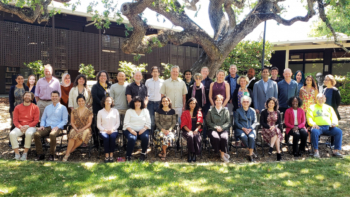 All good things must come to an end. I am deeply grateful for the CASBS experience. What a absolutely transformative year it has been. Thank you my dear fellow class mates and thank you wonderful staff of Stanford University’s Centre for Advanced Study in the Behavioural Sciences. Thank you Margaret Levi for your leadership in this very challenging year, and allways. A big thanks also to Stanford Medicine’s Presence Program and in particular my host and dear friend Abraham Verghese.
All good things must come to an end. I am deeply grateful for the CASBS experience. What a absolutely transformative year it has been. Thank you my dear fellow class mates and thank you wonderful staff of Stanford University’s Centre for Advanced Study in the Behavioural Sciences. Thank you Margaret Levi for your leadership in this very challenging year, and allways. A big thanks also to Stanford Medicine’s Presence Program and in particular my host and dear friend Abraham Verghese.
I will continue my studies and hope to see you all again soon. Miss you already!